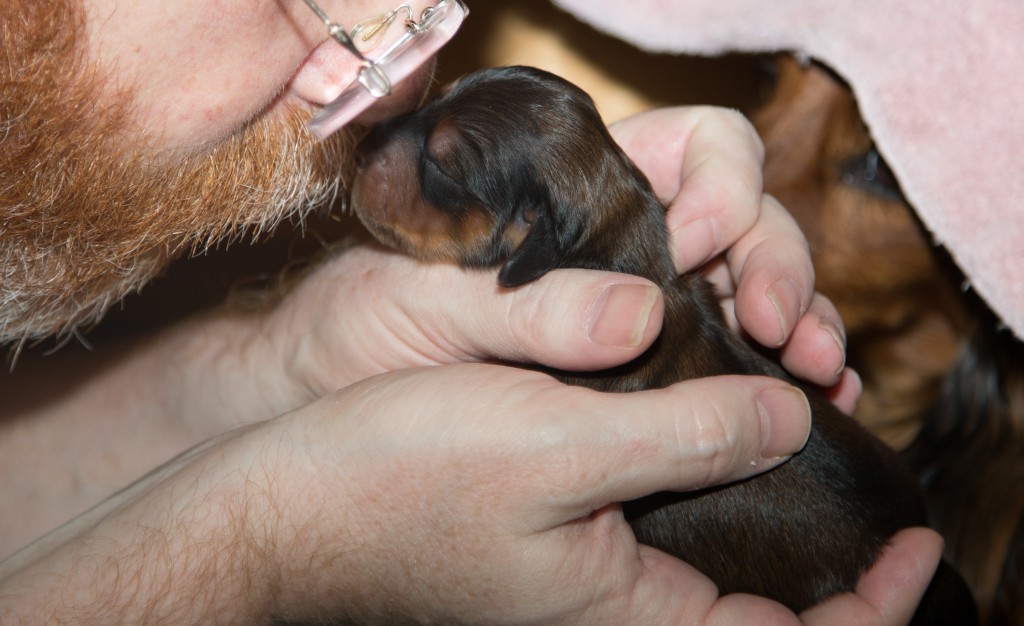
With Valentine’s Day right around the corner, it’s a good time to acknowledge the love we receive from our loyal and furry companions. Photo: Galen Workman (2015)
Whether celebrating a long-term relationship or discovering a new romance, Valentine’s Day is a time to show appreciation for the loves of our lives. Yet, while the spirit of the holiday emphasizes love between people, there are some of us whose primary object of affection isn’t a person at all, but a dog or cat. After all, what’s a purer source of unconditional love (not to mention cuddling fulfillment) than a beloved pet?
In honor of the love we receive from our furry friends, we’re posting a two-part series on how to care for a new puppy or kitten. Here, in part one, Dr. David Horne of Companion Animal Hospital in Santa Cruz gives an informative summary of the basics of puppy care.

Consider purchasing your puppy from a reputable breeder, who will be able to provide documentation regarding its health and pedigree. Photo: Galen Workman (2015)
Picking out your new puppy
There are lots of places to get a new puppy, but according to Dr. Horne, the best source is a reputable breeder. “When buying a new puppy, you want to know a bit about its background, which is one of the benefits of dealing directly with a breeder,” he says. “Nowadays, you can usually go online and find one located near you, which gives you a chance to meet them, visit their kennel and get a good feel for where your puppy is coming from.”
An additional advantage of dealing with a breeder is the assurance it provides in terms of your puppy’s long-term health. “Every dog breed has its particular congenital or genetically-related health issues, ranging from hip dysplasia to vision problems,” says Dr. Horne. “A quality breeder will be able to provide documentation that shows their dogs are free of these conditions.” For added confidence, Dr. Horne recommends educating yourself on the particular breed of dog you’re interested in so you know what issues to ask about when meeting with a breeder.
Veterinary examination and treatment
Once you’ve chosen your puppy, the next thing to do is take it in for a veterinary exam. In addition to vaccinating against common infections like distemper, parvo and heartworm disease, a veterinarian will de-worm your puppy and check for the presence of congenital health issues. “Even if the breeder says the dog has been vaccinated, I recommend having your veterinarian give them another vaccine after adoption, just to make sure all your bases are covered,” advises Dr. Horne.

To avoid a potentially frustrating experience, new puppy owners should take a proactive approach to potty training. Photo: Shelby Lopaty (2015)
Potty training
With puppies, one of the most crucial aspects of domestication is potty training. According to Dr. Horne, being proactive early can make things a lot easier in the long term. “Dogs are creatures of habit, so if you can get them to do their business outside from the get-go, they’re much less likely to ever do it inside. However, if you let them run loose in the house and they have a few accidents on the carpet, the scent of the carpet along with the remembered experience can make it very difficult to break them of the habit. The best strategy is to keep a close eye on them at all times to avoid accidents. Regularly take them outside to go and praise them when they’re doing it the correct way.”
As an aid to potty training, Dr. Horne recommends crating. “Any time you’re unable to watch your puppy, you should put it in its crate to avoid accidents. If you make it a comfortable environment, the dog will learn to love its crate.” Dr. Horne says in addition to helping with potty training, crating can have other benefits. “When you’re traveling, many motels will allow you to keep your dog in your room if it sleeps in a crate.”

Behavior training is important not only for puppies, but for their owners as well. Photo: Aaron Chan (2015)
Behavior training
By the time your puppy is 12 weeks old, it’s time to start thinking about behavior training. Dr. Horne recommends bringing your puppy to professional training classes, although he says these are as much for owners as they are for dogs. “In addition to basic obedience, puppy classes are mostly about teaching owners how to relate to their dogs and model leadership, which is the basis of good behavior. As Cesar Millan says, people need to learn to provide strong leadership for their dogs in addition to love, security and food. If every owner understood how to be a good leader for their pets, we’d have almost no behavioral issues with dogs.”
